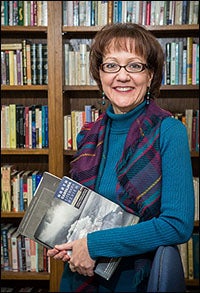NCLR receives Phoenix Award
The North Carolina Literary Review has been recognized with the 2014 Phoenix Award for Significant Editorial Achievement by the Council of Editors of Learned Journals. The award was announced during the Modern Language Association conference in Vancouver on Jan. 8.
This is the journal’s fifth award from this allied organization of the Modern Language Association. CELJ’s membership includes more than 450 editors of scholarly journals.
NCLR is published by East Carolina University and the North Carolina Literary and Historical Association.
According to the CELJ award guidelines, the Phoenix Award is given to a journal that has “launched an overall effort of revitalization or transformation within the previous three years.”
ECU English professor Margaret Bauer, who serves as NCLR editor, said she submitted to this category to call attention to NCLR’s expansion in 2012 to add a second issue each year, an open-access electronic issue titled NCLR Online. Book reviews are now published in these issues “to reach as broad an audience as possible, our mission being to promote North Carolina writers,” said Bauer, who is the Rives Chair of Southern Literature at ECU.
One of the CELJ judges said of NCLR: “What’s most impressive about the recent changes is . . . using online publishing to increase dissemination and take advantage of various digital affordances, while also preserving the gorgeous printed volume.”
Another of the competition’s judges praised NCLR’s “immediate accessibility to a general audience with a high level of substantive writing.” This judge also remarked upon the appearance of the journal: “A particular appealing aspect of the journal is the enlargement of the verbal texts through photographic illustrations that are placed appropriately with the fictional works, the poems and the interviews.” Bauer said that she credits NCLR Art Editor Diane Rodman for the quality of the art featured inside and Art Director Dana Ezzell Gay and the other graphic designers for “the beautiful layout” of the issues.
The additional online issues also allow the editors to publish more of the finalists in the poetry and fiction competitions that the journal manages. Many of these finalists are new writers, according to Bauer, and they are therefore introduced to an even larger audience than the print issues reach.
“One of my missions as editor has always been to give new writers a chance, even in ‘the writingest state,’” Bauer said. Using this descriptor, coined by the late Doris Betts, Bauer points out that with the number of established, talented writers in North Carolina, it would be easy to fill every issue without taking a chance on new talent. “But I enjoy reading and meeting new writers as much as I have enjoyed the opportunity to develop relationships with many of North Carolina’s literary stars,” she said.
The newest issue of NCLR Online will be available in late January. The print issues are published in July. Find subscription information on NCLR’s website, www.nclr.ecu.edu.
